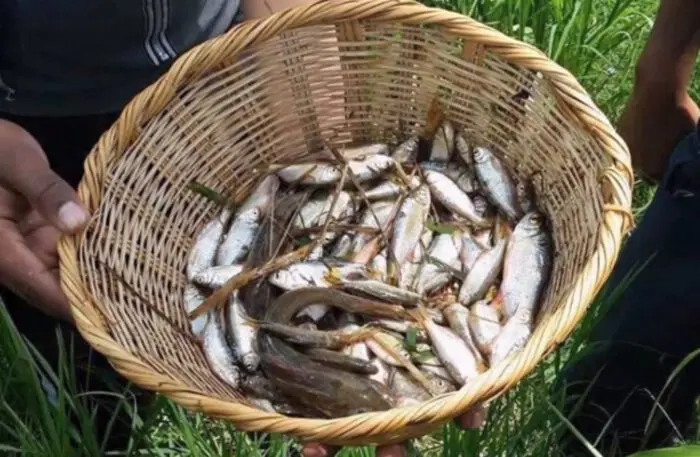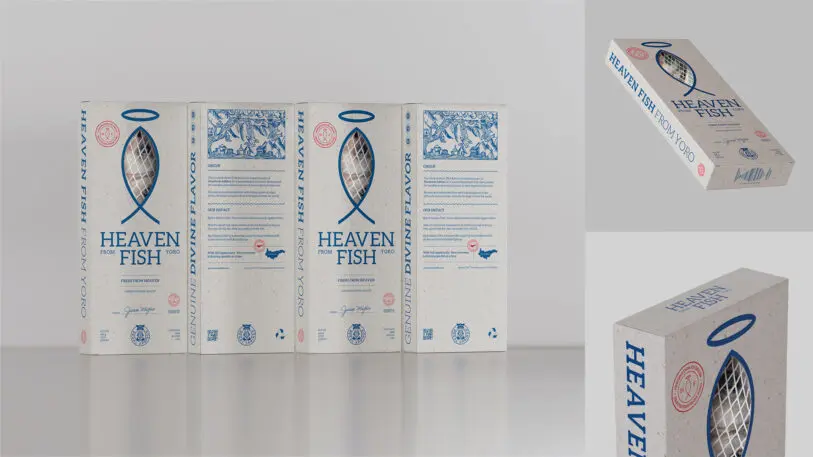Legend has it that in the mid-1800s, a Catholic missionary from Spain visited the poor Honduran town of Yoro and prayed to God to relieve a long and distressing period of hunger. Soon after, for the first time, something astonishing happened: fish started raining from the sky. Every year since, the Lluvia de Peces, the rain of fish, has taken place.
Labeling it a miracle, many townspeople staunchly stand by the myth, as once or twice each year, fish mystifyingly fall onto Yoro’s streets during Biblical-type storms. Now, ad agency Ogilvy and multinational fish company Regal Springs have come together to turn the “miracle” into a source of extra income for the community—with a product aptly dubbed “Heaven Fish.”
Edgardo Melgar, head of communications and strategy at Ogilvy Honduras, experienced the marvel for himself this year, on April 23. In the middle of the night, a rumbling thunderstorm darkened the entire sky, and for 20 to 30 minutes, fish of different sizes poured to the ground. As he sheltered indoors, he heard them thump onto roofs and cars. “It was amazing,” he says. “It’s like nothing I’ve ever seen before.”
The phenomenon does have a possible scientific explanation. Water spouts—tornado-like columns of air—suck up the fish from the ocean, and sling them onto Yoro. It’s the prevailing theory for raining animals of all kinds around the world, which has included frogs, jellyfish, and snakes.
But scientists have never fully ascertained the real cause. It still stuns experts as to why the spout would pull fish from the Atlantic Ocean, about 45 miles away, and always target the small town, and at a similar time every year.

Whatever the reason, Ogilvy had been considering for some time how to transform the fish storm into an economic opportunity for the town’s inhabitants, most of whom live on less than $1 a day. Ogilvy’s Honduras office has a record of impactful work, including the award-winning Morning After Island campaign, which helped push the Honduran government to rescind a ban on the morning-after pill.
Ogilvy teamed up with their client, Regal Springs, a sustainable fish farming firm and one of the biggest companies harvesting fish, mainly tilapia, in Latin America, and with the municipality of Yoro. Together, they formulated a plan to pay residents for catching the fish, on a per-fish basis. For the first time, on April 23, people rushed outside, using objects like hammocks and supermarket bags as nets, to grab the “catch of the day,” Melgar says, which included tilapia, snapper, and bass.

People then took the fish to local Regal Springs centers for cleaning, from where they were sent to the main factory hubs for processing and sustainable packaging, made primarily from local banana peels. The product, called Heaven Fish, was shipped to more than 200 restaurant and grocery partners in Honduras, from chains like Mongolian Wok and TGI Fridays, to upscale local eateries. The trademark destination of origin makes the product rare, allowing for a premium charge.
Melgar admits there were reservations from the community at first. For decades, the event has provided residents a rare treat to enjoy seafood, in a place where the staple fare is corn and beans. And it’s been a chance for people to come together at a yearly festival that honors the missionary, who’s buried in the town, with a parade and carnival.
That will all still continue, Melgar says, but now with an added economic opportunity. This year, a quarter of residents signed on to catch the fish—becoming “fishing” contractors with Regal Springs—and more have expressed interest. While it’s not a year-round source of income for the locals, it’s a form of supplemental cash; 80% of the revenue Regal Springs generates from Heaven Fish goes directly to the people of Yoro.
Melgar says the price paid per fish varied according to the species, but that the catch averaged at about $6 per pound. Some families collected 30 pounds or more, filling up small wagons. “There’s not so much fish that you need to catch to have an increase [in income],” he says.
Recognize your brand’s excellence by applying to this year’s Brands That Matter Awards before the early-rate deadline, May 3.